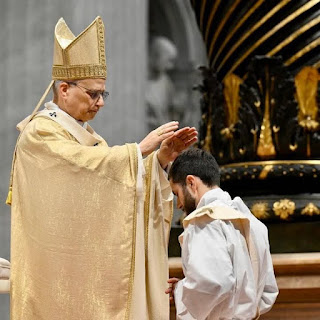THAT THEY MAY BE ONE: THE UNITY JESUS PRAYED FOR
Homily for the Seventh Sunday of Easter, Year C
Fr. Ugochukwu Ugwoke, ISch
Bible Readings: Acts 7:55-60; Revelation 22:12–14, 16–17, 20; John 17:20-26
Some years ago, a dying mother wrote a farewell letter to her three children. In the letter, she expressed her love, her dreams for their future, and one urgent plea: “No matter what life brings, stay united. Stand by one another. Do not let anything tear you apart.” The children, deeply moved, honored her words. Through all of life’s challenges, they stood together, supported one another, and kept their mother’s legacy alive.
In today’s Gospel, Jesus, nearing the end of his earthly mission, also offered his own “farewell prayer.” Like the dying woman, Jesus’ deepest desire was not only for the well-being of his disciples but for their unity - a unity that is rooted in divine love and truth. Jesus prayed not just for the apostles, but for all those who will believe in him through the word of his disciples (v. 20). That includes us - you and me.
The content of his prayer is: “That they may all be one. As you, Father, are in me and I am in you, may they also be in us” (v. 21). This is no ordinary farewell prayer. It is the heart of Christ poured out for the Church. It is a divine desire that the community of believers mirror the very unity of the Trinity. In this prayer, Jesus did not pray for uniformity, but for unity - a unity rooted in love, truth, and mission. He envisioned a Church so united in love that the world cannot help but believe in the message it proclaims. This unity is not cosmetic or political; it is a unity that flows from our communion with God and with one another.
Sadly, we live in a world that struggles with disunity. Divisions in families, communities, and even in the Church, run deep. We are often divided by tribe, politics, ideology, or denomination. Often, pride, ego, ethnicity, politics, and unforgiveness eat away at our unity. In a situation like this, the priestly prayer of Jesus: “That they may be one” challenges all of us. As Christians, we must work for reconciliation, resist division, and model the love that unites rather than separates.
Stephen, the first Christian martyr, embodied the very unity and divine indwelling that Jesus prayed for. Filled with the Holy Spirit, he gazed into heaven and saw Jesus standing at the right hand of God - a rare image, as Jesus is usually depicted as seated. Here, he was standing - in honor, in solidarity, in readiness to welcome Stephen. Stephen prayed, not for vengeance, but for mercy: “Lord, do not hold this sin against them” (v. 60). Does that sound familiar? It should. It echoes Jesus’ words on the cross: “Father, forgive them…” (Luke 23:34). Stephen was the fruit of Jesus’ prayer in John 17 - he is a believer united to Christ, filled with the Spirit, forgiving his enemies, and glorifying God in his death.
In the second reading, we hear a vision of the Church’s ultimate hope: union with God in eternity. The Spirit and the Bride - symbols of the Church - cry out, “Come, Lord Jesus!” This is the longing of every heart that is united to God. But it is also a challenge: those who long to be with Christ must first learn to live in unity with one another.
Dear friend, unity is not an optional accessory in the Christian life. It is the very sign by which the world will know that we are Christ’s disciples. And it starts with us. When we forgive, when we listen, when we resist gossip, when we pray together, when we reach out across differences, we answer the prayer of Jesus: “That they may be one.” May God give us the grace to build bridges, not walls. And may our unity be a light that leads others to believe. Amen.



Comments
Post a Comment